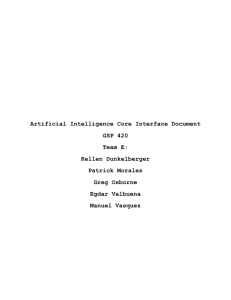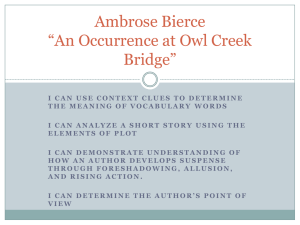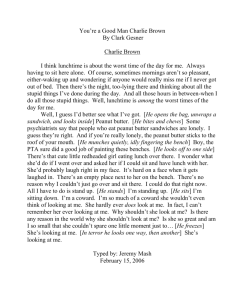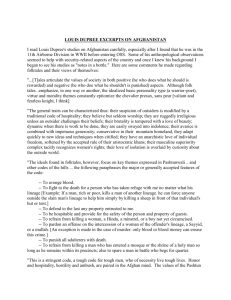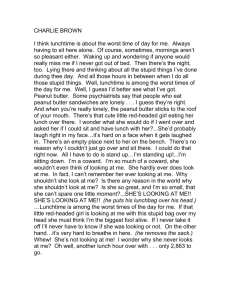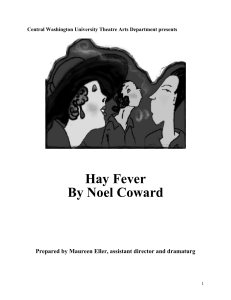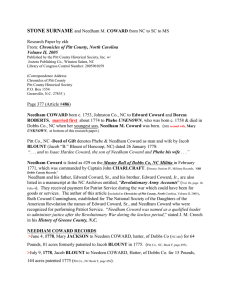1 By studying how the writing of this period both reflected... developments, students will sharpen their critical reading skills as well...
advertisement
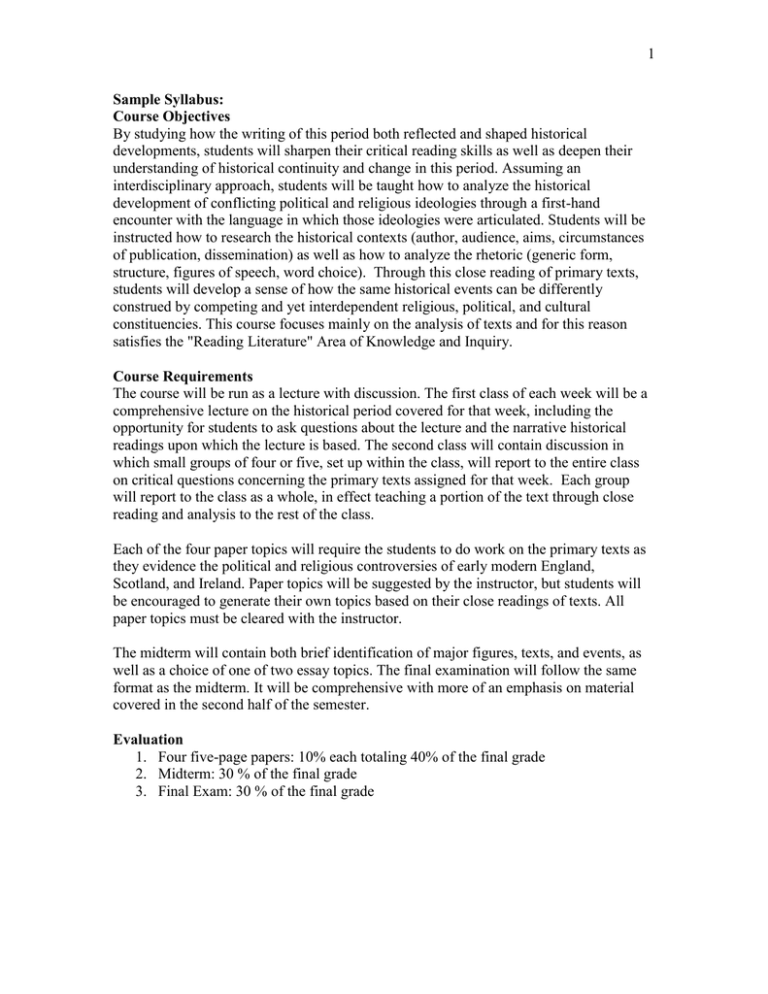
1 Sample Syllabus: Course Objectives By studying how the writing of this period both reflected and shaped historical developments, students will sharpen their critical reading skills as well as deepen their understanding of historical continuity and change in this period. Assuming an interdisciplinary approach, students will be taught how to analyze the historical development of conflicting political and religious ideologies through a first-hand encounter with the language in which those ideologies were articulated. Students will be instructed how to research the historical contexts (author, audience, aims, circumstances of publication, dissemination) as well as how to analyze the rhetoric (generic form, structure, figures of speech, word choice). Through this close reading of primary texts, students will develop a sense of how the same historical events can be differently construed by competing and yet interdependent religious, political, and cultural constituencies. This course focuses mainly on the analysis of texts and for this reason satisfies the "Reading Literature" Area of Knowledge and Inquiry. Course Requirements The course will be run as a lecture with discussion. The first class of each week will be a comprehensive lecture on the historical period covered for that week, including the opportunity for students to ask questions about the lecture and the narrative historical readings upon which the lecture is based. The second class will contain discussion in which small groups of four or five, set up within the class, will report to the entire class on critical questions concerning the primary texts assigned for that week. Each group will report to the class as a whole, in effect teaching a portion of the text through close reading and analysis to the rest of the class. Each of the four paper topics will require the students to do work on the primary texts as they evidence the political and religious controversies of early modern England, Scotland, and Ireland. Paper topics will be suggested by the instructor, but students will be encouraged to generate their own topics based on their close readings of texts. All paper topics must be cleared with the instructor. The midterm will contain both brief identification of major figures, texts, and events, as well as a choice of one of two essay topics. The final examination will follow the same format as the midterm. It will be comprehensive with more of an emphasis on material covered in the second half of the semester. Evaluation 1. Four five-page papers: 10% each totaling 40% of the final grade 2. Midterm: 30 % of the final grade 3. Final Exam: 30 % of the final grade 2 Course Outline: Part One: The Early Century 8/30/04 Introduction 9/2/04 The Tudor Predecessors 9/7/04 James I and the Succession 9/9/04 Ireland in 1600: After Kinsale Ireland from Kinsale to the Plantation of Ulster: 16011609 Coward, chapter 1 2 Coward, pp. 91-113 Shakespeare, Richard II (excerpt) Richard Stanyhurst, Description of Ireland (1577) Francis Bacon, Novum Organum (excerpt) Coward, pp. 117124; 127-150 Documents: James I, True Law of Free Monarchies (1598) James I, “Speech to Parliament” (1609) Trial records, Gunpowder Plot Coward, pp. 124; Lennon, Chapter 10: “Ulster and the Crisis of the Nine Years War” Documents: Edmund Spenser, “A View of the Present state of Ireland” (c. 1596); Fynes Moryson, Itinerary Parliament, Plantation in Ulster (1610) 3 9/14/04 English Culture and Literature, 1603-1625: An Overview King James Bible (excerpts) Shakespeare, Macbeth Donne, Holy Sonnets Poems by George Herbert 9/16/04 Irish Culture and Literature: An Overview 9/21/04 Parliament, King, Religion Bardic poetry: (Aonghus Ó Dalaigh, On Eire Tadhg Dall O Huiginn, “AVisit to Eniskillen,” Eochaidh Ó hEoghusa, “Metamorphosis 1603.” Eoghan Rua Mac an Bhaird, “Looking towards Spain,” Fear Flatha Ó Gnimh, “The Death of Ireland.” Coward, 151-158 William Laud, Visitation Articles (1635) Puritan pamphlets 9/23/04 Charles: The Prerogatives of a King Coward, pp. 158169 Documents: Petition of Right (1628) 9/28/04 Ireland: The 1620s, Plantation, Wentworth and the Revolt of Ulster Geoffrey Keating, selected poems and History of Ireland; late Bardic poems 4 10/5/04 The Scottish Crisis Coward, 178-182 the Book of Common Prayer (Charles) the National Covenant 10/7/04 Build up to Civil War Coward, 185-197 Grand Remonstrance pamphlets (handout) Part Two: The Civil War 10/12/04 The Outbreak of War (1) Coward, 197-204 Statement of the Levelers 10/14/04 The First Civil War Coward, 204-228 10/19/04 Religious Factions in the War Coward, pp. 228233 10/21/04 Midterm 10/26/04 The Second Phase and the Trial of Charles 10/28/04 No class (conference) Coward, 234-237; 238-244 The trial of Charles Charles I (John Gauden), Eikon Basilike Milton, Eikonoklastes 5 11/2/04 Religious Literature of the Civil War Reading Women’s Peition (1649) Margaret Fox on George Fox George Fox, writings from the journal The Book of Revelation, chapters 19-20 11/4/04 Political Literature of the Civil War (1) Coward, pp. 238243 John Milton, Areopagitica (1643) Part Three: Cromwell and the Restoration 11/09/04 Political Literature of the Civil War (2) John Lilburne, England’s New Chains Discovered (1648) Hobbes, Leviathan (excerpts) (1651) Cromwell and the Protectorate Coward, pp. 244-261 11/16/04 (Thurs. Class) The Irish Massacre Cromwell, “Report from Ireland to Parliament:Drogheda” Marvell, “An Horatian Ode upon Cromwell’s Return from Ireland” 11/18/04 The Fall of the Protectorate 11/11/04 Coward, pp. 261-277 6 11/23/04 Restoration Coward, pp. 281-303; 304-332 Christopher Wren, visual sources Samuel Pepys and John Evelyn, Diaries (excerpts) Daniel Defoe, Journal of the Plague Year 11/25/04 No class 11/30/04 James and the Crisis Coward, pp. 333-342 12/2/04 1688: The Glorious Revolution Coward, pp. 342-44, 347-365 Documents: Parliament, Bill of Rights, 1689, etc. Coward, pp. 395-445 12/7/04 12/9/04 1690: William and the Battle of the Boyne Review
